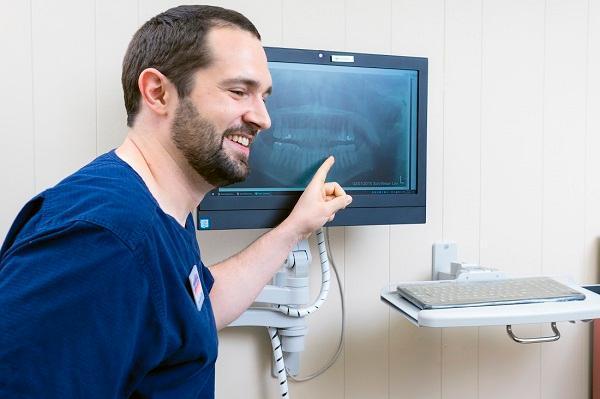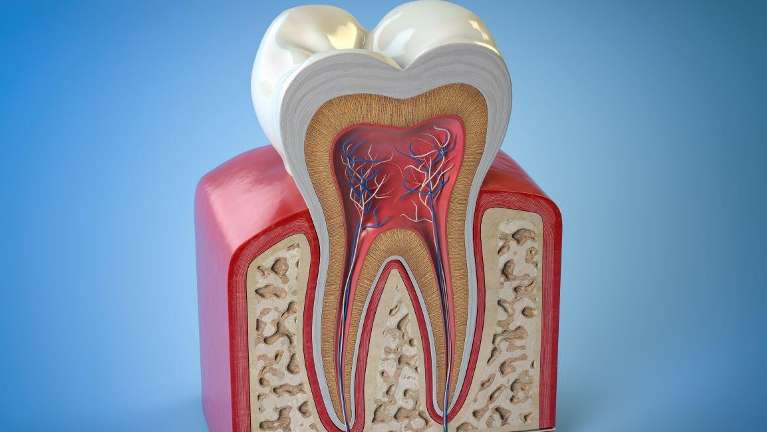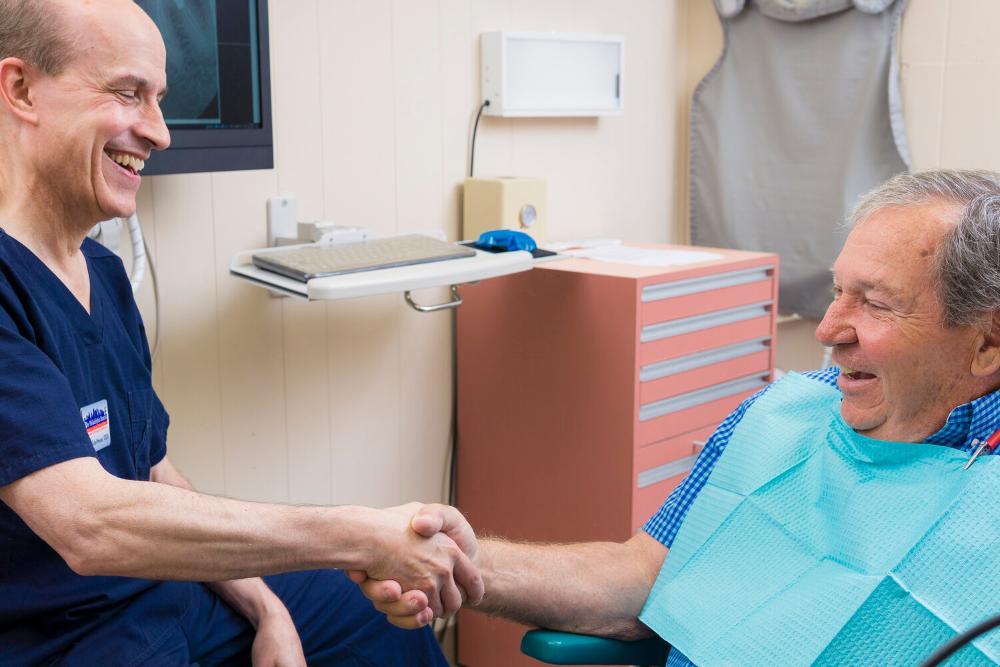
Root Canal Treatment in Philadelphia
The thought of a root canal may make you feel queasy, but did you know that it’s a tooth-saving procedure? Many patients think root canals hurt, but that’s not the case. Root canals provide relief because they remove the infection that's causing your pain.
Do you have a toothache and think you might need a root canal? Call The Philadelphia Dentist at (215) 342-7718 for a same-day emergency dental appointment. We open at 7 AM, seven days a week, 365 days a year!
 Our Northeast Philadelphia Dental Team Makes Your Comfort a Priority
Our Northeast Philadelphia Dental Team Makes Your Comfort a Priority
Our entire dental care team puts your comfort first in everything we do, and we’re especially sensitive to your feelings about root canals. To help you relax, we’re pleased to offer you gentle nitrous oxide (laughing gas) sedation at no additional charge. Nitrous oxide will help you relax during your procedure so you can get the critical care you need.
If there’s anything else we can do to improve your experience, please don’t hesitate to let us know.
Understanding the Benefits of Root Canal Therapy in Philadelphia
Choosing a root canal over a dental extraction is wise because it helps you maintain your natural teeth, eat your favorite foods, and smile confidently. Our dental team recommends root canal therapy to remove the infected pulp within your tooth. Some of the benefits of root canal therapy are as follows:
Painless
Once we numb the affected area, you won’t feel any more pain or discomfort from your infected tooth or when we gently perform the root canal procedure.
Cost-Effective
A root canal is often less expensive and more efficient than tooth extraction. You won’t have to worry about additional appointments or tooth replacement.
Visually Appealing
After your root canal, we will add a dental crown to strengthen and protect your tooth. A dental crown looks and functions like a natural tooth.
Frequently Asked Questions
In most cases, yes. Our priority is to provide whatever treatment you need to get you out of pain right away. A toothache, for example, could be the result of anything from food stuck between your teeth to a root canal infection.
Same-Day Dental Care in Greater Philadelphia
First, our emergency dentists will uncover the source of your pain. Then they will explain the treatment they recommend to provide immediate relief. We commonly perform procedures like:
- Emergency dental fillings
- Emergency root canals
- Emergency tooth extractions
- Emergency dental bonding
- Emergency infections
- Emergency crowns
- Emergency repair of crowns, bridges, dentures, and partials
Contact Our Northeast Philadelphia Dental Clinic
Your first step when you have a dental emergency is to call The Philadelphia Dentist at (215) 342-7718. Our experienced team of caring professionals will listen to your concerns and schedule your appointment for the same day. When you get here, we’ll do whatever it takes to provide the relief you need and get your oral health back on track.
As experienced emergency dentists in Northeast Philadelphia, Dr. Schriftman and Dr. Ambriz routinely perform wisdom teeth extractions and root canal therapy. In fact, we are able to treat any dental emergency you face and provide the urgent pain relief you need. Because we want you to be comfortable, we offer nitrous oxide or laughing gas with no additional charge.
Comfortable Wisdom Teeth Removal
In the case of wisdom teeth or third molars, if they’re causing problems, it’s best to remove them. Our ancient ancestors needed the chewing power of a third set of molars, but we don’t. And since they’re so far back in your mouth, wisdom teeth are difficult to clean. This puts you at risk for gum disease and cavities, so our dentists usually recommend removing wisdom teeth.
Root Canal Treatment in Greater Philadelphia
As for root canals, The Philadelphia Dentist knows that the pain of an infected or abscessed tooth can be so excruciating that you can’t function. We’ll make it a priority to relieve your pain first. Once we numb your tooth with a local anesthetic, you’ll experience immediate relief. Dr. Schriftman and Dr. Ambriz will perform a root canal to clear away the infection, which is what’s causing the pain in the first place.
Contact Your Northeast Philadelphia Emergency Dentist
If you have a toothache or infected tooth, call us at (215) 342-7718 to schedule a same-day emergency appointment at our Northeast Philadelphia dental office. You can rely on our experienced dentists to provide immediate relief and a long-term solution to your problem.
A root canal is a dental procedure that solves an infection in the inner parts of your tooth. Each of your teeth attaches to your jawbone via its roots. Inside the root are thin passages called canals which hold blood vessels and nerves. With tooth damage, this area may become engulfed by bacteria, and the primary way you’ll know that you need a root canal is a severe toothache.
However, along with intense tooth pain, you may also experience other common symptoms. Some of these are:
- Swollen and painful gums
- An abscess or an infected eruption that may be white
- Extreme sensitivity to hot, cold, and bite pressure
- Sour taste in your mouth due to infectious fluid
How Root Canals Treat Tooth Infections
Like any other part of your body, an infection in your tooth must be treated and eliminated as soon as possible. One danger of untreated dental disease is that it can spread to adjoining tissues. This can become an emergency if the inflammation associated with infection threatens to block your airways or reach vital organs.
When Philadelphia Dentists perform root canal treatments, they use precision instruments to open your tooth and scour your inner tooth, completely removing the infected tissue. We then seal your inner tooth with a rubber-like substance that resists subsequent infections. Finally, we protect your remaining tooth, usually with a dental crown covering it on all sides.
To learn more, we recommend you call the Philadelphia Dentist and schedule an appointment today.
Root canal therapy has a bad reputation, but in actuality, it's a dental procedure that eliminates infection, preserves your natural tooth, and stops the pain you're experiencing. So, once you have undergone a root canal, is it necessary to get a dental crown?
Caring for Your Infected Tooth
When the interior pulp of a tooth becomes infected, it can be painful and lead to further health issues. A root canal involves removing the infected tissue from inside the tooth before cleaning, disinfecting, and sealing it to prevent further dental concerns.
A root canal is an effective treatment that saves your natural tooth.
What Happens after a Root Canal?
After your dentist has successfully eliminated the infection from your tooth's pulp, they might suggest placing a dental crown on it. This decision is based on the tooth's condition and its location in your mouth. If the tooth is in good shape, or if it's a front tooth that underwent a root canal, they might place a tooth-colored filling. However, they will likely protect it with a crown if it's a molar.
Need a Root Canal in Philadelphia, PA?
If you want to schedule an appointment with The Philadelphia Dentist, we will happily take your call! You can reach our dental office at (215) 342-7718.
Why Our Dentists May Recommend a Root Canal
A root canal infection develops when bacteria enter the innermost part of the tooth called the dental pulp. It usually occurs because of a deep cavity, gum disease, or trauma to the tooth.
Like any other part of your body, an infection in your tooth needs to be treated and eliminated as soon as possible. To get rid of the painful infection, Dr. Schriftman or Dr. Ambriz will recommend a root canal procedure.
If we don’t remove the infection, the pain will worsen, and we will eventually need to remove the tooth. Root canals don’t just relieve your pain – they also save your tooth.
Signs That You Have an Infected Tooth
Most people realize that they have a root canal infection when they start to experience an excruciating toothache that worsens over time. But other symptoms are not as obvious:
- Extreme sensitivity when touched
- Lingering sensitivity to hot and cold temperatures
- A whitish raised bump on your gums
- Swollen and tender gums
- Darkening of the tooth
- A nasty odor in your mouth
If you have a toothache or notice any of the above symptoms, please call your emergency root canal dentist in Northeast Philadelphia. We’re open seven days a week starting at 7 AM, and we’ll see you the same day to provide relief and improve your oral health.
Meet Our Doctor:

Dr. Lee Schriftman DDS, FAGD, FICOI
Thank you for choosing The Philadelphia Dentist, Philadelphia’s Most Convenient Dentist!
Our highly-skilled, kind, and friendly team will AMAZE you! I grew up in the Philadelphia area and graduated from the Temple University School of Dentistry. I then served in the United States Air Force as a dentist both in Virginia and Texas, where I received advanced training in all of the dental specialties. As a general dentist, I continue to attend many hours of advanced dental training every year so that I can give the families in my care the ...
The Root Canal Procedure
First, our dentists numb your mouth with a local anesthetic to make sure your mouth is numb before we begin so you don't feel any pain. The next step is to open a small hole in your tooth that they use to access the infected root canal.
They gently and thoroughly clear away the infection, disinfect the tooth, and fill the hollowed-out inside of the tooth. Root canal treatment may require several visits.
Do You Need an Emergency Root Canal in Philadelphia
Our dental care team knows that when you’re in pain, you don’t want to wait a moment longer for relief. The Philadelphia Dentist is open at 7 AM, seven days a week (even on holidays), so call us now, and we’ll arrange your dental treatment for the same day.
Call us now at (215) 342-7718 to schedule your emergency root canal in 19152, 19124, Northeast Philadelphia, Rhawnhurst, and the greater Philadelphia area.
Featured Blog Posts - Root Canal Therapy
Philadelphia Root Canal Specialists: Your Guide to Pain-Free Dental Care

If you are experiencing tooth pain, it can be scary and stressful. Unfortunately, tooth pain is something most people have to deal with at one point in their lives, and often it happens at an inopportune time. The good news is that The Philadelphia Dentist offers emergency dental care ...
The Importance of Immediate Care: Emergency Root Canal in Philadelphia

Root canals are considered dental emergencies because they leave you with pain that worsens without dental treatment. Additionally, the infection can spread to other teeth, putting them at risk.
The root canal is located deep in the tooth, and immediate dental care is crucial when it is exposed to ...
How We Save Teeth – Root Canal Explained

Tooth damage comes in many forms, but often the result is the same, a tooth root infection. Your outer tooth layer, or the enamel, may be the hardest substance in your body, but bacterial growth's slow and relentless activity can eventually wear a hole. We know these holes as tooth ...
